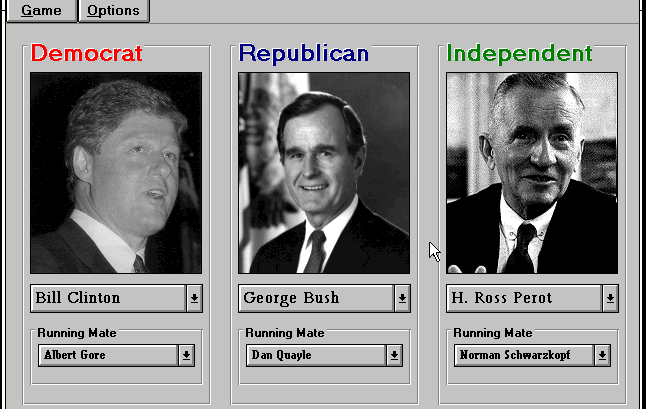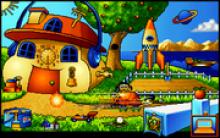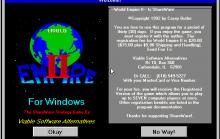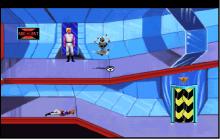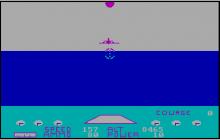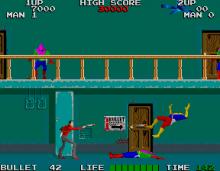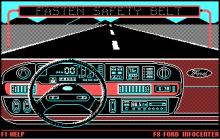Power Politics
Press Keyboard right side: Alt+Enter keys to switch to full screen game play, and Alt+Enter keys to return.
How to play Power Politics
Double click using the mouse on the Power Politics icon in Windows 3.11, choose SVGA (Super VGA) for Maximum colors. When the copy protection screen comes up just hit enter the game has been cracked. It is easy to get started with Power Politics, but knowing the controls helps streamline the experience.
- Mouse Navigation – The game primarily relies on the mouse for navigation.
- Click to Select Options – Players click through different menu sections to manage campaign strategies.
- Drag & Drop – Some features, like adjusting media coverage or selecting campaign locations, involve drag-and-drop mechanics.
- Icons & Buttons – Candidates, budget settings, polling data, and voter outreach are accessible through various tabs.
- Pop-up Windows – Strategy updates, debates, and major campaign events appear in pop-up sections.
Unlike modern games with extensive keyboard shortcuts, Power Politics keeps things simple. It was designed for a straightforward point-and-click experience.
Power Politics Description
Power Politics is a game from the early ‘90s managed to predict a real U.S. election outcome. Power Politics wasn’t just another government simulation—it was designed with a sharp focus on campaign strategy, media influence, and polling data. There is a reason universities used it as a teaching tool.
The Game That Made Politics a Playable Strategy
It was 1992 when Mindscape first launched Power Politics, later acquired from Will Vinton’s Cineplay Interactive. The game revolved around U.S. presidential elections, allowing players to step into the shoes of political candidates and run their campaigns from start to finish.

There is no denying that the game was ambitious in its approach. Players didn’t just click buttons and make superficial choices—they had to manage advertising budgets, fundraising strategies, public appearances, and even select running mates who could shift the political landscape. It was all about making the right moves and adjusting strategies based on real-time polling data.
But perhaps the most fascinating feature was its “what-if” mode, where historical candidates could be placed in theoretical matchups against figures from different eras. What if Abraham Lincoln ran against John F. Kennedy? How would Franklin D. Roosevelt have fared against Ronald Reagan? The game let players find out.
How Power Politics Predicted a Real Election
It wasn’t just a fun simulation—it had real-world accuracy. Using historical election data and political behavior models, Power Politics correctly predicted Bill Clinton’s victory in the 1992 U.S. presidential race. That fact alone solidified its reputation as more than just a game.
There is a level of depth that separated it from other political simulations. Players had access to public opinion metrics, allowing them to adjust their stances or pivot their campaigns in response to voter reactions. Those who understood the mechanics knew that winning wasn’t just about popularity—it was about strategy, timing, and voter targeting.
Why Universities Used It as a Learning Tool
Over 400 universities incorporated Power Politics into their curriculum as an educational tool. There was no better way to demonstrate how real-world campaign strategies worked in a controlled, interactive environment.
Students didn’t just play—they learned about electoral processes, media influence, and the significance of fundraising. The game encouraged strategic thinking, challenging players to manage campaigns in ways that mirrored actual political dynamics.
The developer, Randy Chase, had plans to update the game for the 2008 election, but his passing prevented further developments.
Closest Modern Adaptation: Political Machine
There are newer games that attempt the same political simulation concept, but none quite capture the same predictive quality. The closest modern adaptation is Political Machine, a game where players control presidential candidates and develop campaign strategies based on voter demographics and political trends.

It was designed with satirical elements, giving players the chance to run campaigns using exaggerated caricatures of real politicians. Unlike Power Politics, it leans more into entertainment rather than hyper-accurate simulations.
Power Politics developed by Software Technology, Inc. and published by Cineplay Interactive, Inc.. Released in 1992.
You create a presidential candidate with various strengths and weaknesses, or use one from the past 30 years to see if you can rewrite history. You must set his or her schedule, and decide which issues to address and whether to take a conservative or liberal stance on them, how much to spend on advertising, what to say in the ads, what to do with your running mate, and whether to use dirty tricks. The more support your candidate wins, the more contributions will pour in. If your polls aren't good enough, you can hire a spin doctor.
Power Politics was more than a game—it was a political simulation with impressive accuracy. It helped players and students understand campaign strategies, media influence, and how voter demographics shaped election outcomes.
It may not have the flashy graphics or modern UI of today’s games, but its predictive depth and educational value made it a standout experience. And even decades later, it remains one of the most fascinating approaches to political simulation gaming.
Cheats/Hints/Walkthroughs for Power Politics
Success in Power Politics isn’t just about picking a popular candidate. Here are key strategies to improve campaign effectiveness:
- Balance Advertising with Fundraising – Spending too much on media early can drain resources.
- Use Polls to Adjust Stances – Swing voters matter. If an issue isn’t resonating, shifting political positions can boost support.
- Pick a Running Mate Wisely – Choosing a strong vice-presidential candidate can help cover weak points in a campaign.
- Monitor Public Opinion Trends – Polls fluctuate. An unpopular stance early in the game doesn’t mean it won’t become valuable later.
- Engage in Debates – Skipping debates reduces voter confidence in your candidate’s ability to lead.
- Think About Electoral Votes – It’s not about winning the popular vote—it’s about securing enough electoral votes to win.
Some players enjoy experimenting with wild scenarios, placing historical figures in hypothetical races. Others aim for realistic campaign tactics to test what strategies would work in real-life elections.
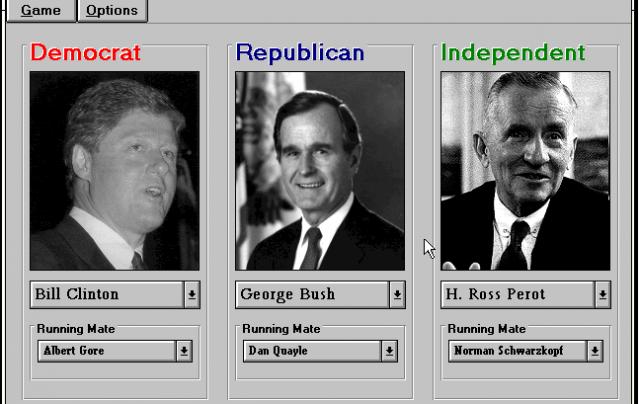
Power Politics - additional information







